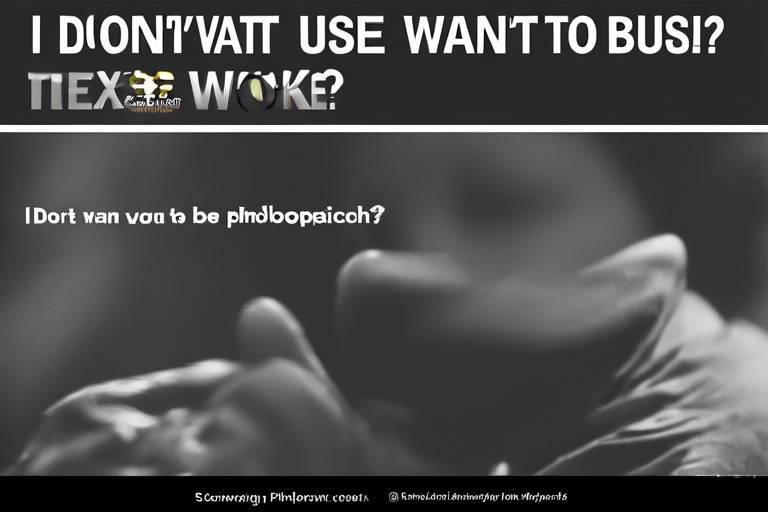What is the Meaning of Life - A Philosophical Perspective
The quest for understanding the meaning of life has puzzled humanity for centuries, transcending cultures, time periods, and individual beliefs. It's like embarking on a journey without a map, where every twist and turn leads us to new insights and questions. Some might argue that the meaning of life is as elusive as a shadow, always just out of reach, while others find it nestled within their daily experiences and relationships. The beauty of this philosophical inquiry lies in its diversity; there isn’t a one-size-fits-all answer. Instead, our understanding of life’s purpose is shaped by a myriad of factors, including existential questions, cultural influences, and personal beliefs. So, what does it really mean to live a meaningful life? Let's dive into the depths of this profound question, exploring various philosophical interpretations that have emerged over time.
Existentialism, a philosophical movement that gained traction in the 20th century, places a strong emphasis on individual freedom and choice. Think of it as a blank canvas where you, the artist, get to paint your own picture of meaning. According to existentialists, meaning is not handed to us on a silver platter by some cosmic force; rather, it is something we create through our personal experiences and decisions in an indifferent universe. This perspective can be both liberating and daunting. Imagine standing at a crossroads, with paths stretching out in every direction—each choice you make shapes your unique narrative. In this light, the meaning of life becomes a personal quest, where authenticity and self-discovery play pivotal roles. It invites us to ask ourselves: What do we truly value? What makes our hearts sing?
For many, religion serves as a guiding light in the search for meaning. Across various faiths, teachings and doctrines provide frameworks that help followers navigate the complexities of existence. Religion often offers not just answers, but a sense of community and belonging. It’s like having a well-worn map in a vast, uncharted territory. Each religion has its unique take on life’s purpose, and these perspectives can be incredibly enriching. Let’s take a closer look at some of the prominent religious interpretations of meaning.
In Christianity, the meaning of life is intricately tied to one’s relationship with God. Christians believe that life’s purpose is found in love, service, and the pursuit of eternal life through faith. The teachings of Jesus emphasize compassion and selflessness, urging individuals to look beyond themselves and serve others. This perspective can be likened to a garden where love is the seed that, when nurtured, blossoms into a fulfilling life of purpose. By fostering connections with others and engaging in acts of kindness, Christians find profound meaning in their existence.
Buddhism offers a different lens through which to view life’s meaning. It teaches that true meaning arises from the cessation of suffering. Imagine a heavy backpack filled with stones—each stone represents a burden or attachment. Buddhism encourages individuals to lighten their load through mindfulness and compassion, promoting a path to enlightenment. By understanding the nature of suffering and embracing a mindful approach to life, practitioners find a deeper sense of purpose that transcends the mundane.
In Hinduism, life is viewed as a journey towards moksha, or liberation from the cycle of birth and rebirth. This belief underscores the importance of karma (the law of cause and effect) and dharma (one's duty or path). Picture life as a grand tapestry where each thread represents our actions and responsibilities. By fulfilling our dharma and understanding the impact of our karma, we weave a meaningful existence that ultimately leads us closer to liberation. For many Hindus, this journey is not just about personal fulfillment but also about contributing to the greater good.
Humanism presents yet another perspective, focusing on human values and the importance of reason. It suggests that meaning can be derived from our relationships, creativity, and the pursuit of knowledge. Think of it as a vibrant mosaic made up of individual tiles—each tile representing a unique experience or connection. In this view, the meaning of life is not dictated by external forces but is crafted through our interactions with others and our contributions to society. It encourages us to embrace our humanity and seek fulfillment in the present moment.
Cultural contexts significantly shape how individuals perceive life's meaning. Just as a painter uses different colors to create a masterpiece, our beliefs and values are influenced by the cultural narratives we encounter. These narratives guide our understanding of purpose and existence, often reflecting the collective wisdom of generations. Consider how literature and art explore themes of existence, serving as mirrors that reflect our innermost thoughts and emotions.
Literature and art have long been vehicles for exploring existential themes. From Shakespearean tragedies to modern novels, storytelling captures the essence of the human experience, allowing us to grapple with our own understanding of meaning. Similarly, art evokes emotions and prompts introspection, inviting us to ponder life’s mysteries. These creative expressions can be likened to a compass, guiding us through the labyrinth of existence and offering insights into our own journeys.
As scientific advancements continue to challenge traditional views of meaning, new questions emerge about existence, consciousness, and the universe's nature. The discoveries in fields like quantum physics and neuroscience prompt us to reconsider our understanding of reality. It’s as if we’re peeling back layers of an onion, revealing deeper truths about ourselves and the cosmos. This evolving perspective influences philosophical thought, pushing us to rethink what it means to live a meaningful life in an ever-changing world.
- What is the meaning of life according to existentialism? Existentialism suggests that meaning is not given but created through individual choices and experiences.
- How do religions define life's purpose? Religions often provide frameworks and teachings that guide followers toward spiritual fulfillment and connection with the divine.
- What role does culture play in shaping our understanding of meaning? Cultural contexts influence beliefs and values, shaping how individuals perceive life's purpose.
- Can art and literature help us understand life's meaning? Yes, they explore existential themes and reflect our innermost thoughts, guiding us in our quest for meaning.
- How does science impact our understanding of meaning? Scientific advancements challenge traditional views, prompting new questions about existence and consciousness.

Existentialism and Life's Meaning
Existentialism is a philosophical movement that dives deep into the murky waters of human existence, challenging us to confront the most profound questions about life and our place in the universe. It’s like standing at the edge of a vast ocean, staring into the depths and wondering what lies beneath the surface. The existentialists argue that instead of waiting for a higher power or predetermined fate to hand us our purpose, we must take the reins and create our own meaning through our choices and experiences. This perspective is liberating yet daunting; it places the responsibility of meaning squarely on our shoulders.
At the heart of existentialist thought is the idea that life is inherently **absurd**—that is, it lacks any intrinsic meaning or purpose. Think of it as being tossed into a chaotic carnival without a map. You can wander around aimlessly, or you can choose to engage with the attractions, create your own fun, and carve out your own path. This belief leads to a crucial existentialist tenet: **freedom**. We are free to make choices, but with freedom comes the weight of responsibility. Every decision we make shapes our identity and our understanding of life’s meaning.
Existentialists like Jean-Paul Sartre famously proclaimed that “existence precedes essence,” meaning that we first exist, and only later define ourselves through our actions. This notion resonates deeply in a world that often feels indifferent to our struggles. It’s a call to action, urging us to embrace our freedom, confront our fears, and take ownership of our lives. The challenge lies in navigating this freedom without succumbing to despair or nihilism.
Moreover, existentialism encourages us to engage with our emotions and experiences authentically. It invites us to ask ourselves: What makes us feel alive? What ignites our passions? By reflecting on these questions, we can begin to uncover personal meanings that resonate with our unique journeys. In this sense, meaning is not a universal truth but a **personal tapestry** woven from our experiences, relationships, and aspirations.
To illustrate this further, consider the following aspects of existentialism that help shape our understanding of life's meaning:
- Choice: Every choice we make contributes to our identity and understanding of purpose.
- Authenticity: Embracing our true selves leads to a deeper connection with our existence.
- Responsibility: With freedom comes the duty to navigate our lives meaningfully.
In summary, existentialism presents a compelling framework for understanding life's meaning. It empowers us to become the architects of our destinies, urging us to explore the depths of our existence and find significance in our choices. By embracing the absurdity of life and taking responsibility for our actions, we can create a rich tapestry of meaning that reflects our unique experiences and aspirations. So, what will you choose to create in your life?

Religious Perspectives on Meaning
When we dive into the realm of religion, we encounter a rich tapestry of beliefs and teachings that shape our understanding of life's purpose. Each religion offers its unique lens through which adherents can interpret their existence and find meaning. For many, these perspectives provide a sense of direction, community, and spiritual fulfillment. But what exactly do these various religions say about the meaning of life? Let's explore some of the most influential religious viewpoints.
At the heart of many religious teachings is the idea that life's meaning is intricately linked to a relationship with the divine. For instance, in Christianity, believers are taught that their purpose is found in a loving relationship with God. This connection is not merely about following rules; it’s about love, service, and the pursuit of eternal life through faith. Christians are encouraged to live out their faith through acts of kindness and compassion, reflecting the love of Christ in their daily lives.
Christianity posits that the ultimate purpose of life is to glorify God and enjoy a relationship with Him. This relationship is nurtured through prayer, worship, and the study of the Bible. Many Christians believe that by following the teachings of Jesus Christ, they can find deeper meaning in their lives. The concept of grace plays a vital role here, as it emphasizes that meaning is not earned through deeds but is a gift from God. This perspective encourages believers to spread love and hope in a world that often feels chaotic and uncertain.
In contrast, Buddhism offers a different approach to understanding life's meaning. Instead of seeking a relationship with a deity, Buddhism teaches that meaning arises from the cessation of suffering. This path is achieved through mindfulness, meditation, and compassion. Buddhists believe that by understanding the nature of suffering and embracing the Four Noble Truths, individuals can attain enlightenment. This state of being is characterized by a profound understanding of existence and a deep sense of peace, ultimately leading to liberation from the cycle of rebirth.
Hinduism presents a multifaceted view of life's purpose, seeing existence as a journey toward moksha, or liberation from the cycle of life and death. Central to this belief are the concepts of karma and dharma. Karma refers to the law of cause and effect, suggesting that our actions have consequences that shape our future experiences. Dharma, on the other hand, represents the moral duties and responsibilities we hold in our lives. By fulfilling one’s dharma and accumulating good karma, individuals can progress on their spiritual journey toward moksha.
These religious perspectives not only provide frameworks for understanding life's purpose but also foster communities that support individuals in their quest for meaning. Whether through communal worship, shared rituals, or collective teachings, religion serves as a guiding force for many in navigating the complexities of existence.
In summary, the exploration of religious perspectives reveals a diverse array of beliefs that contribute to our understanding of life's meaning. From the Christian emphasis on love and service to the Buddhist focus on mindfulness and the Hindu pursuit of liberation, each tradition offers valuable insights that resonate with the human experience.
- What is the main purpose of life according to Christianity? Christianity teaches that the purpose of life is to glorify God and develop a loving relationship with Him through faith and service.
- How does Buddhism define the meaning of life? Buddhism defines life's meaning as the cessation of suffering, achieved through mindfulness and compassion, leading to enlightenment.
- What role does karma play in Hindu beliefs? In Hinduism, karma is the law of cause and effect, where one's actions influence their future experiences and spiritual journey.
- Can meaning be found outside of religious beliefs? Yes, many people find meaning through humanistic approaches, relationships, creativity, and the pursuit of knowledge.

Christian Views on Meaning
Christianity offers a profound perspective on the meaning of life, deeply rooted in the belief that our existence is inherently tied to a relationship with God. This relationship is not just a passive acknowledgment of a higher power; it is an active engagement that shapes our identity, purpose, and actions. In this view, life’s meaning is found in the pursuit of love, service, and faith, which are essential components of a fulfilling spiritual journey.
At the heart of Christian belief is the notion that God created humanity with a purpose. According to the Bible, humans are made in the image of God (Genesis 1:27), which brings a sense of inherent value and dignity to every individual. This divine image calls Christians to reflect God's love and grace in their lives, emphasizing that our interactions with others are a direct expression of our relationship with the divine. In essence, the more we embody love and service, the closer we align with our intended purpose.
Moreover, Christianity teaches that life's ultimate fulfillment comes through a personal relationship with Jesus Christ. This relationship is not merely about adherence to religious doctrines; it is about experiencing transformation and renewal. Christians believe that through faith, individuals can find hope, redemption, and a sense of belonging. This belief is beautifully encapsulated in the teachings of Jesus, who emphasized love for one another, stating, "You shall love your neighbor as yourself" (Matthew 22:39). This commandment serves as a guiding principle for Christians, urging them to seek meaning through acts of kindness and compassion.
In addition to love and service, the concept of eternal life plays a crucial role in shaping the Christian understanding of meaning. Many Christians believe that life does not end with physical death; instead, it transitions into an eternal existence with God. This hope for eternal life provides a framework for understanding present suffering and challenges. It encourages believers to view their earthly experiences as part of a larger narrative of redemption and grace. Therefore, the pursuit of a meaningful life is intertwined with the promise of everlasting life, fostering resilience and purpose even in difficult times.
To further illustrate the Christian perspective on life's meaning, consider the following key elements:
- Relationship with God: Engaging in prayer, worship, and community to deepen one's connection with the divine.
- Love and Service: Acting with compassion and kindness towards others as a reflection of God's love.
- Faith and Hope: Trusting in God's plan and the promise of eternal life, which provides comfort and purpose.
In conclusion, the Christian viewpoint on life's meaning is rich and multifaceted. It invites individuals to explore their faith actively, engage with their communities, and seek a deeper understanding of their purpose through love and service. Ultimately, it is this relationship with God that transforms lives and offers a profound sense of meaning in an often chaotic world.
Q: What is the primary belief in Christianity regarding the meaning of life?
A: The primary belief is that life's meaning is found in a relationship with God, emphasizing love, service, and faith.
Q: How does Christianity view suffering in relation to life's purpose?
A: Christianity teaches that suffering can be part of the human experience, but it is viewed through the lens of hope and the promise of eternal life, which gives it a deeper significance.
Q: Can anyone find meaning in life through Christianity?
A: Yes, Christianity is inclusive, inviting all individuals to explore their faith and find meaning through a personal relationship with Jesus Christ.

Buddhist Concepts of Purpose
Buddhism offers a unique perspective on life's purpose, emphasizing the cessation of suffering as a fundamental goal. At its core, Buddhism teaches that life is inherently filled with suffering (Dukkha), and understanding this suffering is the first step toward achieving a meaningful existence. The path to finding purpose is not about accumulating wealth or status but about cultivating mindfulness and compassion. This journey towards enlightenment is often depicted as a transformative process that encourages individuals to look inward and confront their own experiences.
One of the key teachings in Buddhism is the concept of mindfulness. Practicing mindfulness involves being fully present in each moment, allowing individuals to observe their thoughts and feelings without judgment. This practice helps in recognizing the transient nature of life and the impermanence of all things. By acknowledging that both joy and suffering are temporary, individuals can learn to appreciate the present moment, thus finding deeper meaning in their experiences.
Additionally, Buddhism emphasizes the importance of compassion, not only towards oneself but also towards others. This is encapsulated in the idea of Metta or loving-kindness, which encourages individuals to extend goodwill and kindness to all beings. By fostering a compassionate mindset, one can cultivate a sense of connection with others, which is essential for finding purpose in life. After all, when we help others alleviate their suffering, we often find that our own sense of purpose becomes clearer.
Moreover, the Buddhist path is often described through the Four Noble Truths, which outline the nature of suffering and the path to its cessation:
- The Truth of Suffering (Dukkha): Recognizing that suffering is an inherent part of life.
- The Truth of the Cause of Suffering: Understanding that attachment and desire lead to suffering.
- The Truth of the Cessation of Suffering: Realizing that it is possible to end suffering.
- The Truth of the Path to the Cessation of Suffering: Following the Eightfold Path as a guide to ethical and mental development.
The Eightfold Path consists of eight interconnected practices that promote ethical conduct, mental discipline, and wisdom. These practices include Right Understanding, Right Intent, Right Speech, Right Action, Right Livelihood, Right Effort, Right Mindfulness, and Right Concentration. By following this path, individuals can cultivate a life that is not only meaningful but also leads to the ultimate goal of Nirvana, a state of liberation from the cycle of birth and rebirth (Samsara).
In summary, Buddhism teaches that life's purpose is not a destination but a journey of self-discovery and compassion. By embracing mindfulness and the principles of the Eightfold Path, individuals can transform their understanding of existence and find profound meaning in the act of living. This perspective encourages us to let go of our attachments and desires, allowing us to experience life in its fullest form, free from the burdens of suffering.
- What is the main goal of Buddhism? The main goal of Buddhism is to attain enlightenment and liberation from suffering through understanding and compassion.
- How does mindfulness contribute to finding purpose? Mindfulness helps individuals become aware of their thoughts and feelings, allowing them to appreciate the present moment and find deeper meaning in their experiences.
- What is Nirvana in Buddhism? Nirvana is the ultimate state of liberation from the cycle of birth and rebirth, characterized by the absence of suffering and desire.

Hindu Beliefs on Life's Purpose
In Hindu philosophy, the concept of life's purpose is intricately woven into the fabric of spiritual and ethical living. Central to these beliefs is the idea of moksha, which refers to liberation from the cycle of birth, death, and rebirth, known as samsara. This journey towards moksha is not merely an escape from the physical world but a profound quest for understanding one's true self and the ultimate reality, Brahman. Hindus believe that achieving moksha requires a harmonious balance of karma (action) and dharma (duty), which together create the moral framework guiding an individual's life choices.
The path to realizing one's purpose can be seen through several lenses, each offering unique insights into how one can navigate the complexities of existence. The four purusharthas, or goals of human life, are essential in this context:
- Dharma: The ethical and moral duties one must fulfill, often determined by one's age, caste, and stage of life.
- Artha: The pursuit of material prosperity and success, which is essential for supporting oneself and one's family.
- Kama: The enjoyment of life, including love, pleasure, and emotional fulfillment, which contributes to a well-rounded existence.
- Moksha: The ultimate goal of liberation and spiritual enlightenment, transcending the physical realm.
These four goals illustrate that Hindu beliefs encompass a holistic approach to life's purpose, where fulfillment is not just about spiritual enlightenment but also about leading a balanced life that honors one's responsibilities and desires. Furthermore, the concept of karma plays a pivotal role; it posits that every action has consequences, shaping future experiences and ultimately guiding the soul toward its destiny. Thus, individuals are encouraged to live with integrity, compassion, and mindfulness, as these qualities foster positive karma and lead to a more meaningful existence.
Additionally, the notion of yoga in Hinduism serves as a practical tool for individuals seeking to align their lives with their spiritual goals. Through various forms of yoga—be it bhakti (devotion), jnana (knowledge), or karma (selfless action)—individuals can cultivate a deeper understanding of their purpose and the interconnectedness of all beings. Ultimately, Hinduism teaches that life's purpose is not a one-size-fits-all answer; it is a personal journey that each individual must undertake, characterized by exploration, growth, and a profound connection to the universe.
1. What is moksha in Hinduism?
Moksha refers to the liberation from the cycle of birth and rebirth, allowing the soul to unite with the ultimate reality, Brahman.
2. How does karma influence my life's purpose?
Karma, the law of cause and effect, suggests that your actions directly impact your future experiences, guiding you toward fulfilling your life's purpose.
3. What are the four purusharthas?
The four purusharthas are Dharma (duty), Artha (prosperity), Kama (pleasure), and Moksha (liberation), each representing a goal in human life.
4. Can yoga help me find my purpose?
Yes, different forms of yoga can help you align with your spiritual goals and provide clarity on your life's purpose through self-exploration and discipline.

Humanistic Approaches to Meaning
When we dive into humanistic approaches to understanding life's meaning, we find ourselves in a realm that celebrates the intrinsic value of human beings. This perspective emphasizes that meaning is not handed down from above or dictated by external forces; rather, it emerges from our own experiences, relationships, and the choices we make. Isn't it fascinating to think that we hold the keys to our own existence? In a world that often feels chaotic and indifferent, humanism offers a refreshing lens through which we can view our purpose.
At the heart of humanism lies a deep respect for human values. It suggests that our interactions with others, our creativity, and our quest for knowledge are vital in crafting a meaningful life. Think of it like an artist with a blank canvas; each stroke of the brush represents a choice, a relationship, or a moment of inspiration that contributes to the overall masterpiece of one's life. This approach encourages us to focus on the present and to find fulfillment in our everyday lives.
Moreover, humanism advocates for personal responsibility. It urges us to take charge of our destinies and to recognize that we are not mere passengers on this journey. Instead, we are the architects of our own lives. This notion can be incredibly empowering! It invites us to ask ourselves profound questions: What do I value most? What brings me joy? How can I contribute to the world around me? By reflecting on these questions, we can uncover layers of meaning that might have otherwise gone unnoticed.
One of the most compelling aspects of humanistic philosophy is its focus on relationships. The connections we forge with others can serve as a powerful source of meaning. Whether it's through friendship, family, or community, these bonds enrich our lives and provide a sense of belonging. Research has shown that strong social connections can lead to greater happiness and even longer life. So, in a way, fostering these relationships is not just a personal endeavor; it’s a vital component of a meaningful existence.
Additionally, humanism places a premium on creativity as a pathway to meaning. Engaging in creative pursuits—be it writing, painting, or even cooking—allows individuals to express themselves and explore their inner worlds. This expression can lead to profound insights and a deeper understanding of one's purpose. Just as a flower blooms, so too can our understanding of meaning flourish when we allow ourselves to be creative and authentic.
In summary, humanistic approaches to meaning remind us that life is not a puzzle waiting to be solved but rather a canvas waiting to be painted. By embracing our human experiences, nurturing our relationships, and expressing our creativity, we can carve out a purpose that resonates deeply within us. So, what will you create on your canvas today?
- What is humanism? Humanism is a philosophical stance that emphasizes the value and agency of human beings, focusing on the importance of human experiences and relationships in finding meaning.
- How does creativity contribute to a meaningful life? Engaging in creative activities allows individuals to express themselves, explore their thoughts and feelings, and discover new aspects of their identity, all of which can enhance one's sense of purpose.
- Can relationships really provide meaning in life? Yes! Strong social connections are linked to increased happiness and fulfillment, making them essential for a meaningful existence.
- Is meaning the same for everyone? No, meaning is subjective and can vary greatly from person to person based on individual experiences, values, and beliefs.

The Role of Culture in Defining Meaning
Culture plays a pivotal role in shaping our understanding of life's meaning, acting as a lens through which we interpret our experiences and beliefs. Imagine culture as a vast tapestry, woven from the threads of history, tradition, language, and social norms. Each thread contributes to the overall picture, influencing how individuals perceive their purpose and existence. Different cultures offer unique narratives that inform our values and guide our actions, leading us to ask ourselves profound questions about why we are here and what we should strive for.
In many ways, culture acts as a compass, directing individuals toward specific ideals and goals. For instance, in collectivist societies, the emphasis is often placed on community and familial bonds, instilling a sense of duty and responsibility toward others. Conversely, in more individualistic cultures, personal achievement and self-fulfillment may take precedence, encouraging individuals to pursue their passions and aspirations. This divergence in focus illustrates how cultural context can significantly impact one's interpretation of meaning.
Moreover, cultural narratives are often reinforced through various mediums such as literature, art, and religion. These narratives serve not only as entertainment but also as a means of exploring existential questions. Consider how stories from different cultures encapsulate the struggles and triumphs of the human experience. For example, the epic tales of ancient civilizations often convey moral lessons and ideals that resonate with their societal values, providing insight into what those cultures deem meaningful.
To illustrate this further, let’s take a closer look at how different cultures articulate their understanding of life's purpose through literature and art:
| Culture | Literary/Artistic Expression | Core Themes |
|---|---|---|
| Western Culture | Shakespeare's Plays | Love, Ambition, Tragedy |
| Eastern Culture | Chinese Poetry | Nature, Harmony, Transience |
| Indigenous Cultures | Storytelling Traditions | Community, Ancestry, Spirituality |
As we can see, the themes explored in these cultural expressions not only reflect the values of the society but also provide individuals with a framework for understanding their own lives. This is particularly relevant in today's globalized world, where diverse cultural influences intersect, leading to a richer, albeit more complex, understanding of meaning.
Furthermore, the impact of globalization cannot be overlooked. As cultures intertwine, individuals are exposed to a multitude of perspectives that challenge traditional beliefs. This exposure can lead to a broader understanding of life's meaning, as people begin to integrate ideas from various cultures into their own belief systems. However, it can also create confusion and a sense of dislocation as individuals grapple with conflicting values and narratives.
Ultimately, the role of culture in defining meaning is a dynamic interplay between tradition and modernity. It invites us to reflect on our own beliefs and encourages us to engage with the diverse perspectives that shape our world. By embracing this complexity, we can cultivate a deeper appreciation for the myriad ways in which life’s purpose can be interpreted, leading to a more enriched and fulfilling existence.
- How does culture influence our personal beliefs about meaning?
Culture provides the context and framework through which we interpret our experiences, shaping our beliefs and values about what constitutes a meaningful life. - Can exposure to different cultures change our understanding of life's purpose?
Absolutely! Exposure to diverse cultures can broaden our perspectives, allowing us to integrate new ideas and challenge our existing beliefs about meaning. - What role does art play in shaping cultural narratives about meaning?
Art serves as a powerful medium for expressing and exploring cultural narratives, often reflecting the values and ideals that inform a society’s understanding of purpose.

Influence of Literature and Art
Literature and art serve as powerful mirrors reflecting the complexities of human existence and the quest for meaning. Through the ages, artists and writers have delved deep into the human experience, exploring profound questions about purpose, identity, and the nature of reality. Think about it—when you read a novel or gaze at a painting, you’re not just consuming content; you’re engaging with the artist’s interpretation of life itself. This engagement can evoke emotions, provoke thoughts, and inspire a deeper understanding of your own life journey.
From the existential musings of Dostoevsky to the vibrant canvases of Van Gogh, literature and art have the unique ability to encapsulate the essence of what it means to be human. They often tackle themes such as love, loss, suffering, and joy, prompting us to reflect on our own experiences. For instance, consider the way Shakespeare’s plays delve into the intricacies of human relationships and moral dilemmas. His work remains timeless, as it resonates with audiences across generations, illustrating that the quest for meaning is a universal endeavor.
Moreover, the cultural narratives embedded within art and literature can significantly shape our understanding of life’s meaning. They often challenge societal norms and provoke critical thinking, encouraging individuals to question their beliefs and values. For example, the works of authors like Virginia Woolf and James Baldwin push boundaries and invite readers to explore diverse perspectives on identity and existence. These narratives not only enrich our understanding of ourselves but also foster empathy towards others, highlighting the interconnectedness of human experiences.
Art, in its various forms, also plays a crucial role in expressing the ineffable aspects of life. A painting can evoke feelings that words may fail to capture, while a poem can articulate the subtleties of emotion in a way that resonates deeply. This interplay between different forms of expression allows for a multifaceted exploration of meaning. As audiences engage with these works, they often find themselves reflecting on their own lives, asking questions like, “What is my purpose?” or “How do I find fulfillment?”
In summary, literature and art not only reflect cultural narratives but also provide a platform for individuals to explore and articulate their understanding of life's meaning. They invite us to engage in a dialogue with ourselves and the world around us, making the exploration of meaning a shared human experience. As we navigate our own paths, these creative expressions can serve as guiding lights, illuminating the complexities of existence and inspiring us to seek our own answers.
- How does literature influence our understanding of life?
Literature provides insights into diverse human experiences, prompting readers to reflect on their own lives and beliefs. - Can art convey meaning without words?
Absolutely! Art can express complex emotions and ideas visually, often resonating on a deeper level than verbal communication. - Why is it important to explore different cultural narratives?
Exploring various cultural narratives broadens our perspective, fosters empathy, and helps us understand the rich tapestry of human experience.

Impact of Science on Meaning
Science has profoundly transformed our understanding of the universe, challenging long-held beliefs about existence and purpose. It’s like peering through a powerful telescope—suddenly, the vastness of space and the intricacies of life come into sharper focus. As we uncover the mysteries of the cosmos, we find ourselves grappling with existential questions that have puzzled humanity for centuries. What does it mean to be alive in a universe governed by the laws of physics? Are we merely a product of chance, or is there a deeper significance to our existence?
One of the most significant contributions of science to our understanding of meaning is the concept of evolution. The theory of evolution by natural selection, proposed by Charles Darwin, suggests that life on Earth is the result of a long, complex process of adaptation and survival. This perspective can be both liberating and daunting. On one hand, it underscores our connection to all living beings, emphasizing that we are part of a grand tapestry of life. On the other hand, it raises questions about the randomness of existence. If we are the result of chance mutations, does that diminish our sense of purpose?
Moreover, advancements in neuroscience have illuminated the workings of the human brain, revealing how our thoughts, emotions, and behaviors are influenced by biological processes. This understanding can lead to a more profound appreciation of human experience, as we recognize that our capacity for love, creativity, and connection is rooted in our biology. However, it also prompts us to reconsider free will and the nature of consciousness. Are we truly the authors of our destinies, or are we simply responding to chemical signals in our brains? The implications of these discoveries can feel overwhelming, yet they also invite us to explore new dimensions of meaning.
As we navigate this scientific landscape, we must also acknowledge the role of technology in shaping our understanding of meaning. The digital age has transformed how we connect with one another and the world around us. Social media, for instance, can foster a sense of community and belonging, but it can also lead to feelings of isolation and disconnection. The constant barrage of information can be intoxicating, yet it raises questions about authenticity and the nature of relationships. Are our online interactions fulfilling, or do they leave us yearning for deeper connections?
In a world where science continues to unveil the mysteries of existence, it’s essential to find a balance between empirical understanding and the search for meaning. While scientific discoveries can challenge traditional beliefs, they also provide a foundation for new interpretations of purpose. For many, the awe inspired by the universe’s complexity can lead to a sense of wonder and gratitude, fostering a deeper appreciation for life itself. Ultimately, the impact of science on meaning is a dynamic interplay between knowledge and belief, prompting us to continually redefine what it means to be human.
- How does science influence our understanding of life's meaning?
Science provides insights into the workings of the universe, prompting us to reevaluate traditional beliefs about existence and purpose. - Can scientific discoveries challenge religious beliefs?
Yes, scientific advancements can lead to questions about faith and spirituality, but they can also coexist and inspire new interpretations of meaning. - What role does technology play in shaping our perception of meaning?
Technology influences how we connect with others and ourselves, affecting our sense of community and the authenticity of our relationships. - Is there a conflict between science and philosophy?
Not necessarily; science and philosophy can complement each other, providing a broader understanding of existence and purpose.
Frequently Asked Questions
- What is the meaning of life according to existentialism?
Existentialism suggests that life’s meaning isn’t handed to us on a silver platter; rather, it’s something we create ourselves through our choices and experiences. Imagine being an artist with a blank canvas—it's up to you to splash on the colors of your life!
- How do religious beliefs shape our understanding of life's purpose?
Religious perspectives provide frameworks that guide individuals toward understanding their purpose. For instance, Christianity emphasizes a relationship with God, while Buddhism focuses on alleviating suffering. Each religion offers unique insights that can illuminate our paths.
- What role does culture play in defining the meaning of life?
Cultural influences are like the lens through which we view existence. They shape our beliefs, values, and even our dreams, helping us navigate the often murky waters of purpose. Just think about how different cultures celebrate life—it's a vivid tapestry of perspectives!
- Can literature and art help us understand life's meaning?
Absolutely! Literature and art often tackle profound themes of existence and purpose, reflecting the cultural narratives that resonate with us. They can spark those “aha!” moments, prompting us to ponder our own lives and what they mean.
- How does science influence our understanding of life's meaning?
Scientific advancements challenge our traditional views and push us to ask deeper questions about existence and consciousness. As we unravel the mysteries of the universe, we might find that our understanding of life’s meaning evolves right along with it!



















